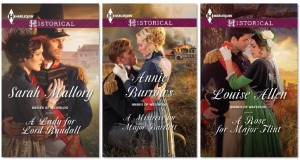My novella for the June historical romance anthology Dancing in the Duke’s Arms (with Grace Burrowes, Shana Galen, and Miranda Neville) is done and off to beta reading, editing, and copy-editing. My story is An Unsuitable Duchess. I posted last time about some research results. Most of that research survived in some form or another in the penultimate version. (Cue applause!!)
While I was madly fixing ::KoffKoff:: revising, I needed some additional research on what songs might have been sung in 1819. This turned out to be slightly harder than I wanted it to be, mainly because what seemed like the most likely on-point resource was a 1794 text that was a Google Books listing only. There was no text available.
I’ve seen this happen when someone, sorry, but often an academic press, has an annotated version of the text on sale, as with The Regency Epicure. There is no defensible reason, in my opinion, for the removal of a public domain title from Google Books just because there’s an annotated version available for purchase. To be clear, of course the annotated version is different and shouldn’t be freely available as to the copyrighted annotations. But the original remains in the public domain and should therefore remain available to the public.
But I digress. The 1794 songbook was not available and I did not have time to see if I could get it on Interlibrary loan. The book is listed in WorldCat, so there are libraries that have it. Nevertheless, I found something that answered the need well enough, and that was The British Melodist or National Song Book, containing English, Scottish, and Irish songs With a Selection of More than Four Hundred Choice Posts and Sentiments. There are several versions, with the earliest available text dated 1822. A similar book from 1813 is not available because some [ expletive ] is selling a paper copy on Amazon. And that someone just grabbed the book from Google and claims to have cleaned up the OCR text. I hate this. It pisses me off. It should not be permitted. It’s selling for $18.00. S0 eff you, dude. Right. HE got the benefit of a book in the public domain and now the actual public is screwed. You’re darn right I’m mad. We should all be angry!
I’m in danger of digressing again. Sorry.
The British Melodist of 1822 is recent enough for me to be confident that I’m not far off base in having my characters mention the titles of songs, and a few lines from one, in 1819.
Some of the songs and their titles surprised me. Here are a few examples.
Black-eyed Susan
All in the downs the fleet was moor’d,
The streamers waving in the wind,
when black-ey’d Susan came on board:
Oh! where shall I my true-love find?
Tell me ye jovial sailors, tell me true,
if my sweet William sails among the crew!
(first verse only)
Here’s another interesting one:
The Soldier’s Widow; or Return from Waterloo.
Sad was the plaint of the wand’ring stranger,
Hungry and pale was the infant she bore;
Return’d from the land of misfortune & danger,
She hop’d to find peace on her dear native shore.O neat was her cottage, and great was her treasure,
A treasure to her more than diamonds or pearl
In the smiles of her William consisted her pleasure,
And the fond caresses of her little girl.Duty commanded, her William attended,
And she could not bear with her soldier to part
She roam’d oe’r the field when the battle was ended,
She kiss’d his pale lip, & she pressed his cold heart.They bore her away, of all comfort bereft her,
Affliction her dart at her bosom did hurl;
Oh no, little darling, one comfort is left her,
The sweet smiling kiss of her dear little girl.
Below is a song title I used in my story. I include the lyrics since they’re culturally significant. Talk about a message, eh? But there’s fascinating subtext there. The warning and moral wouldn’t be necessary if there weren’t young ladies who felt just that way.
No One Shall Govern Me.
When young and thoughtless, Laura said,
No one shall win my heart;
But little dreamt the simple maid,
Of love’s delusive art.
At ball or play,
She flirt away,
And ever giddy be;
But always said,
I ne’er will wed,
No one shall govern me.
No, no, no, no, no, no,
No one shall govern me.But time on airy pinions flew,
And Laura’s charms decay’d;
Too soon alas! The damsel grew
A pettish pert old maid.
At ball or play,
No longer gay,
Poor Laura now you’ll see;
Nor does she cry,
For reasons why,
No one shall govern me.
No, no, no &c.A lesson learned, ye ladies fair,
From Laura’s wretched fate;
Lest you, like her, should in despair
Repent alas! Back too late.Let me advise –
While young, be wise,
Nor coy and silly be;
I’m certain I
Would never cry,
No one shall govern me.
No, no, no &c.
I’d gladly govern’d be.
Here’s another from the last few pages:
Drown it in the Bowl.
The glossy sparkle on the board,
The wine is ruby bright,
The reign of pleasure is restor’d,
Of ease and fond delight.
The day is gone, the night’s our own,
Then let us feast the soul;
If any care or pain remain,
Why drown it in the bowl.This world they say’s a world of woe,
That I do deny;
Can sorrow from the goblet flow?
Or pain from beauty’s eye?
The wise are fools, with all their rules,
When they would joys controul:
If life’s a pain, I say again,
Let’s drown it in the bowl.That time flies fast the poets sing;
Then surely it is wise,
In rosy wine to dip his wings,
And seize him as he flies.
This night is ours; then strew with flowers
The moments as they roll:
If any pain or care remain,
Why drown it in the bowl.
Possibly Interesting End Note
Normally, I would have done a copy and paste of the lyrics text or used an embedded image because, wow. LOTS OF TYPING!!!
But while I was doing my revisions and found myself behind because ::hand waving, a tissue, sobs omgwtf!:: I lost five chapters of revisions and had to completely redo them from paper edits. ::horrible flashbacks::
I became desperate to find a way to go faster where I had long chunks of new text. So, I hooked up my microphone and turned on the Mac dictation feature and dictated those sections. And danged if it didn’t work pretty damned well. And that includes the dictation working in my Windows 7 Parallels virtual machine. I honestly didn’t think Mac dictation would work across the virtual machine, but as long as I clicked in my WordPerfect document, my dictated words appeared.
And so, I dictated these lyrics into this post, and while there were a few hilarious interpretations, the dictation was remarkably accurate, all things considered. It was very quick to go a line at a time for these lyrics and fix the mostly minor issues.
I’m converted now to using dictation for work where I have longer blocks of text to transfer. I always do paper read throughs of my manuscripts so this is a regular occurrence for me. I redid my five chapters of edits in two days — working on my lunch hour (on the laptop) and then at home on the iMac, and let me represent to you that many of those chapters were a sea of ink and paragraphs written on the back of the pages.
A win, over all, I’d say because now there’s less of a barrier to posts like this one.









